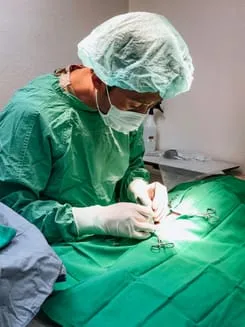TYPES OF TUMORS:

- Mast Cell Tumors: Most common type of skin tumor which can be red, itchy, and grow quickly.
- Lipomas: Common benign fatty tumor. Can be soft and movable under the skin.
- Osteosarcoma: Bone Cancer that typically affects larger breeds of dog’s legs and the occasional spine.
- Histiocytoma: Usually benign, small, red, raised, and hairless. This type of tumor is more common in young dogs.
- Hemangiosarcoma: Cancer of the blood cells and commonly found on the spleen. Can also develop in the pet's skin or heart.
- Melanoma: Typically black or brown-pigmented cancer of the skin. Melanoma can be anywhere from benign to aggressive depending on the area and if it has metastasized to other places.
- Lymphoma: Cancer of the lymph nodes. Tell-tale signs include: loss of appetite, lethargy, and coughing along with swollen lymph nodes. Areas of swelling can be found behind the shoulders, knees, or under the jaw.
- Papilloma: Benign cauliflower-like warts that can be uncomfortable or problematic. A virus (papillomavirus) causes the warts to transfer from one pet to another via direct contact, bedding, or other objects.
SURGICAL PET TUMOR REMOVALWe have qualified veterinarians to examine and identify possible cancer symptoms your pet may have. Rancho Sequoia Veterinary Hospital has top-notch surgical veterinarians to perform all procedures as well as state of the art equipment and technology. If you pet does have a tumor, the first step is diagnosing what type of tumor it is. Steps may include taking a biopsy (removing a few cells from the area using a needle) to which the cells will then be tested alongside a blood sample to determine the overall health of the pet. If the tumor is more advanced, other procedures such as X-rays or draining certain areas such as the lymph nodes may be needed to decide if the cancer has spread. |
SUCCESS OF SURGERYThe success of surgical procedures will depend on the type of tumor, what stage the cancer is in, as well as the age and current health of your pet. The good news is that many procedures are very successful and can give you and your pet many more years of happiness. Early detection is one of the most critical factors in fighting cancer. Yearly wellness checks are very important to help discover the early signs of cancer that can lead to life threating tumors. If you feel your pet has a lump, loss of appetite, or is lethargic, limping, or just not its normal self, call Rancho Sequoia Veterinary Hospital at (805) 522-7476 to make an appointment. |
